The Bible with Nicky and Pippa Gumbel, Classic Version, 2017Sample
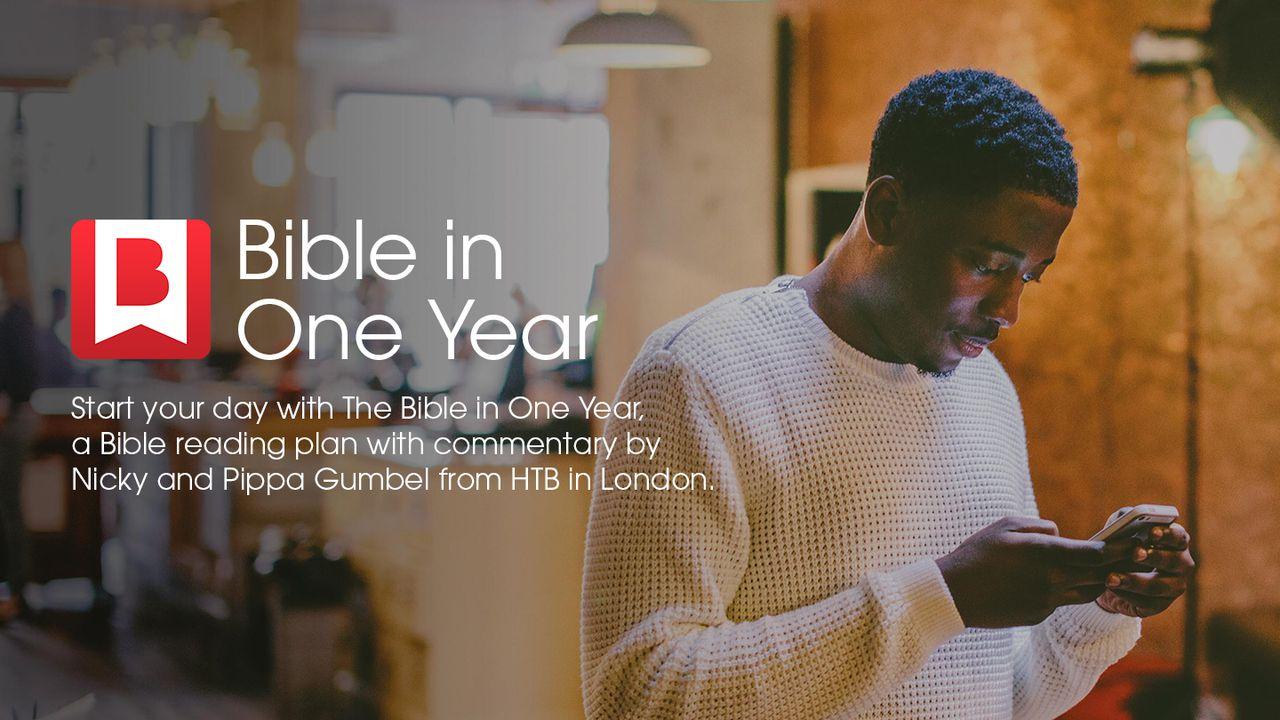
Unlocking Revelation
It stars Martin Sheen and Marlon Brando. Set in the Vietnam War, Apocalypse Now is a 1979 epic war film. The use of the word ‘apocalypse’ is based on the popular misunderstanding of the word as ‘destruction’.
The Greek word apokalupsis, translated ‘revelation’ (Revelation 1:1), is made up of two Greek words – apo (out of) and kalupsis (hiding). The word actually means ‘disclosure’. In the book of Revelation, the veil is taken off. The mystery is unlocked.
‘The revelation of Jesus Christ’ (v.1) has a double meaning. First, it is the revelation that is given by Jesus. Second, it is the revealing of Jesus, who lies hidden in the Old Testament and is revealed in the New Testament. In the book of Revelation, Jesus is further unveiled. We get a clearer disclosure of his great love for us, and his victory over evil.
Psalm 140:1–5
1. Revelation of the righteousness of God
David prays to be rescued from evil people. He speaks of evil thoughts (v.2a), evil words (v.3) and evil deeds (v.4).
Evil is not just about other people. It is about me. All of us have had bad thoughts, said hurtful things and done wrong. All of us have failed to be righteous.
Paul writes, ‘There is no one righteous, not even one’ (Romans 3:10), and then goes on to illustrate his point using a verse from our psalm – ‘the poison of vipers is on their lips’ (Psalm 140:3 and Romans 3:13).
But the apostle Paul explains that now a righteousness from God has been ‘revealed’ (Romans 3:21, GNB). This righteousness from God comes through faith in Jesus Christ to all who believe’ (v.22).
Lord, thank you for the revelation of your righteousness that comes to us through faith in Jesus Christ.
Revelation 1:1–20
2. Revelation of Jesus Christ
This book is a record of the apostle John’s revelation of Jesus, which came to him as he was worshipping. Eugene Peterson writes that ‘we are enlisted as participants in a multidimensional act of Christian worship’. John ‘has worship on his mind and is pre-eminently concerned with worship’. God speaks to John as he is worshipping and Jesus is revealed.
The book of Revelation was written to seven churches in Asia minor (v.11), which were pastored by the apostle John who was in exile on the island of Patmos ‘because of the word of God and the testimony of Jesus’ (v.9). John sees ‘seven golden lampstands’ (v.12), which he tells us represent the ‘seven churches’ (v.20).
Seven in the Bible is the number of completeness and perfection. So, this can be taken to mean the whole church. It is written for you and me. Jesus calls John to write down what he sees. He begins to unlock the ‘mystery’: ‘The seven stars are the angels of the seven churches, and the seven lampstands are the seven churches’ (v.20). Every church has its own angel. Jesus holds all the churches in his hands.
John, in revealing the nature of spiritual reality, uses poetry, songs, metaphors, visions, symbols and pictures. Parts of the book of Revelation are extremely difficult to understand. But it is worth persevering. This is the only book in the Bible where we are specifically told that those who read it will be blessed: ‘How blessed the reader! How blessed the hearers and keepers of these oracle words’ (v.3, MSG).
It seems that the early Christians had already changed their day of rest and worship from Saturday (the Sabbath) to Sunday. The revelation began ‘On the Lord’s Day…’ (v.10) – the day the Lord was resurrected, in other words, Sunday.
The book of Revelation, like the Bible as a whole, centres on Jesus: ‘Jesus Christ, who is the faithful witness, the firstborn from the dead, and the ruler of the kings of the earth’ (v.5). It is very easy to get bogged down in the details of Revelation, but the key is to remain focused on Jesus. The general message of the book is clear – Jesus wins!
Jesus is the one ‘who loves us and has freed us from our sins by his blood, and has made us to be a kingdom and priests to serve his God and Father’ (vv.5b–6). Through Jesus you are loved, loosed from your chains and lifted up.
Your sense of worth is not based on what you do or look like, nor on what others think about you. You are of great value and worth because Jesus loves you so much that he shed his blood for you.
Jesus is going to come again. It will not happen secretly. Everyone will see it: ‘Look, he is coming with the clouds, and every eye will see him, even those who pierced him’ (v.7). You are on the winning team. Jesus is coming back and you will enjoy eternity with him.
John sees ‘someone “like a son of man”’ (v.13). This was Jesus’ favourite way of referring to himself. He sees Jesus in all his majesty and glory, ‘dressed in a robe reaching down to his feet and with a golden sash round his chest’ (v.13). He sees him in all his purity and timelessness: ‘His head and hair were... as white as snow, and his eyes were like blazing fire. His feet were like bronze glowing in a furnace, and his voice was like the sound of rushing waters’ (vv.14–15).
He sees the total splendour of his appearance: ‘In his right hand he held seven stars, and out of his mouth came a sharp double-edged sword. His face was like the sun shining in all its brilliance’ (v.16). Sometimes, when people spend time in the presence of Jesus, their faces seem to shine. This give us a taste of what Jesus himself looks like.
John’s response to the revelation of Jesus is worship: to fall ‘at his feet as though dead’ (v.17). Jesus places his hand on him saying, ‘Don’t fear: I am First, I am Last, I’m Alive. I died, but I came to life, and my life is now forever. See these keys in my hand? They open and lock Death’s doors, they open and lock Hell’s gates’ (vv.17–18, MSG).
Lord Jesus Christ, I want to fall at your feet and worship you today. I give you my fears today. Thank you that, ultimately, I am safe in your hands.
Zechariah 9:1–11:17
3. Revelation of the Saviour
Why are some people so relentlessly positive? It all stems from a little word: ‘hope’. Jesus, as revealed in this passage, sets the prisoners free from ‘their hopeless cells’ (9:11, MSG).
Jesus fills you with hope. However bad your current situation, never give up hope. We are ‘prisoners of hope’ (v.12). Joyce Meyer writes, ‘Real hope is a constant positive attitude that no matter what is happening currently, things will change for the better.’
The words of Zechariah have several levels of fulfilment. Far greater than the historical fulfilment of chapter 9 (through Alexander the Great and the Maccabees), was the fulfilment revealed in Jesus.
‘See, your king comes to you righteous and having salvation, gentle and riding on a donkey, on a colt, the foal of a donkey’ (v.9). These words were fulfilled on the first Palm Sunday, as Jesus entered Jerusalem on a donkey (Matthew 21:1–5; Mark 11:1–11).
Zechariah foresees that a humble, righteous king will come bringing salvation. He is meek, humble and externally poor. His kingdom would not come by traditional methods of battle. He is not a military king (Zechariah 9:10).
He will bring peace to Jews and Gentiles (v.10, see also Ephesians 2:17). His rule will extend from sea to sea (Zechariah 9:10). You will experience great blessings ‘because of the blood of my covenant with you’ (v.11).
He brings freedom for the prisoners (v.11; see also Isaiah 61:1; Luke 4:18). He brings you security: ‘Return to your fortress, O prisoners of hope’ (Zechariah 9:12). He brings you great blessing: ‘I will restore twice as much to you’ (v.12). He is invincible ‘like a warrior's sword’ (v.13; see Revelation 1:16). He brings you salvation (Zechariah 10:16; see also Luke 12:32; John 10:1–16).
There are many other wonderful promises in these prophecies of Zechariah including Jesus as ‘the cornerstone’ (Zechariah 10:4) and the ‘Good Shepherd’ who will pastor the flock with ‘Favour’ and ‘Union’ (11:7). This is in sharp contrast to the shepherds who ‘will not care for the lost, or seek the young, or heal the injured, or feed the healthy’ (v.16).
We also see in this passage a foreshadowing of the betrayal of Judas. The ‘thirty pieces of silver’ (v.12) is the price that was put on Jesus’ head (see Matthew 26:15).
Almost every detail of Jesus’ life, character, mission, death, resurrection and victory was foreshadowed in some way in the Old Testament and revealed in the New Testament.
Father, thank you for the revelation of Jesus Christ, our Saviour and Lord.
Pippa Adds
Revelation 1:13–17
On seeing Jesus, John writes, ‘When I saw him, I fell at his feet as though dead.’
It is easy to think of Jesus as the gentle teacher who walked around Galilee doing good. Here we see him risen, in all his majesty and glory, when the only appropriate response is to fall face down before him.
About this Plan

Start your day with the Bible in One Year, a Bible reading app with commentary by Nicky and Pippa Gumbel. Nicky Gumbel is the Vicar of HTB in London and pioneer of Alpha. 'My favourite way to start the day.' - Bear Grylls, Adventurer
More
We would like to thank Nicky and Pippa Gumbel, HTB for providing this plan. For more information, please visit: https://www.bibleinoneyear.org/
Related Plans
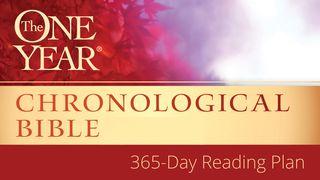
The One Year® Chronological Bible

ICA - 365 Daily Kingdom Living

The Greatest Gift

C.S. Lewis And The Call To Create
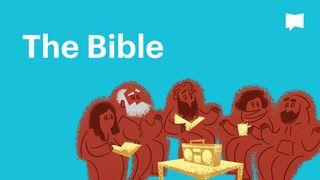
BibleProject | The Bible

Choosing Each Day: God or Self?

Discerning The Voice Of God
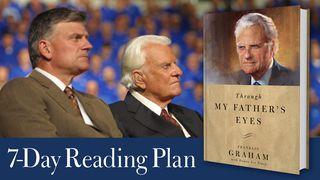
Through My Father's Eyes
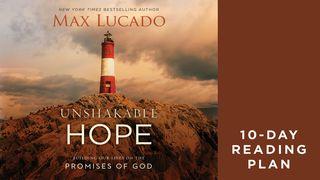
Unshakable Hope: Building Our Lives On The Promises Of God
